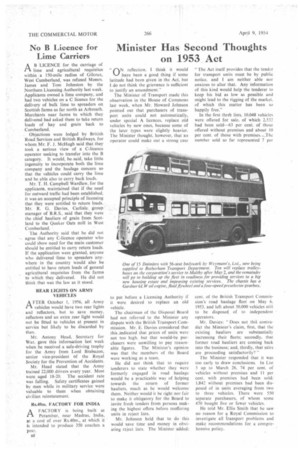Minister Has Second Thoughts on 1953 Act
Page 42

If you've noticed an error in this article please click here to report it so we can fix it.
" ON reflection. I think it would
haye been a good thing if some latitude had been given in the Act, but I do not think the grievance is sufficient to justify an amendment."
The Minister of Transport made this observation in the House of Commons last week, when Mr. Howard Johnson pointed out that purchasers of transport units could not automatically, under special A licences, replace old vehicles by new ones, because some of the later types were slightly heavier. The Minister thought, however, that an operator could make out a strong case to put before a Licensing Authority if it were desired to replace an old vehicle.
The chairman of the Disposal Board had not referred to the Minister any dispute with the British Transport Commission. Mr. E. Davies considered that this indicated that prices of units were not too high. but that would-be purchasers were unwilling to pay reasonable figures. The Minister's opinion was that the members of the Board were working as a team.
He did not think that to require tenderers to state whether they were formerly engaged in road haulage would be a practicable way of helping towards the return of former hauliers, much as he would welcome them. Neither.would it be right nor fair to make it obligatory for the Board to invite fresh tenders from persons making the highest offers before reoffering units in reject lists.
Mr. Johnson held that to do this would save time and money in obviating reject lists. The Minister added:
" The Act itself provides that the tender for transport units must be by public notice, and I am neither able nor anxious to alter that. Any information of this kind would help the tenderer to keep his bid as low as possible and might lead to the rigging of the market. of which this matter has been so happily free."
In the first thrtt lists. 10,048 vehicles were offered for sale, of which 2,532 had been sold-63 per cent, of those offered without premises and about 10 per cent, of those with premises.—The number sold so far represented 7 per
cent, of the British Transport Commission's road haulage fleet on May 6. 1953. and left about 30,000 vehicles still to be disposed, of to independent operators.
Mr. Davies: "Does not thig contradict the Minister's claim, first, that the existing hauliers are substantially increasing their fleets; secondly, that former road hauliers are coming back into the business; and, thirdly, that sales are proceeding satisfactorily? "
The Minister responded that it was too early to draw conclusions. In List 3 up to March 26, 74 per cent, of vehicles without premises and 11 per cent, with premises had been sold: 1,842 Without premises had been disposed of in units averaging from two to three vehicles. There were 550 separate purchasers, of whom some 470 bought five or fewer vehicles.
He told Mr. Ellis Smith that he saw no reason for a Royal Commission to investigate all fransport problems and make recommendations for a comprehensive policy.




































































































